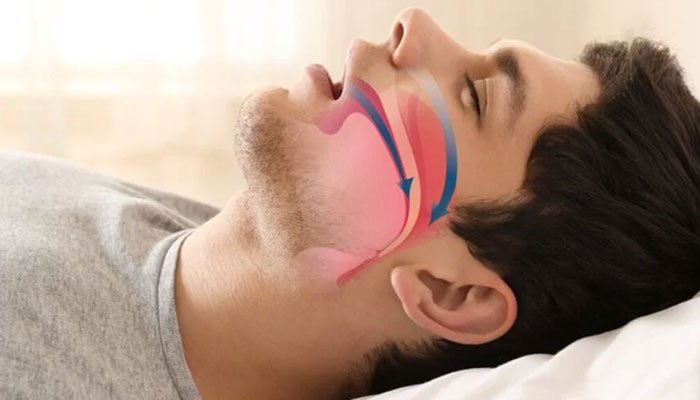Sleeping with Mouth Open: Is It a Sign of a Health Problem? Many people unknowingly sleep with their mouths open — a habit often brushed aside as harmless. But health experts say it can sometimes be a sign of an underlying medical problem that shouldn’t be ignored.
Sleeping with your mouth open isn’t necessarily a medical condition, according to medical experts. In most cases, it happens when your nose is blocked by a cold, allergies, or enlarged tonsils.
Children are more likely to suffer from it, especially if enlarged adenoids or tonsils partially block their nasal passages. The problem often improves as they get older.
Possible medical causes

A bent or crooked nasal septum can also lead to nasal congestion, forcing a person to breathe through their mouth. If the blockage becomes severe, surgery may be recommended. Experts warn that if mouth breathing is accompanied by snoring or difficulty breathing during sleep, it could indicate a more serious condition such as sleep apnea, which requires immediate medical evaluation.
Impact on oral health and sleep quality
Mouth breathing can dry out the mouth, leading to poor oral hygiene, bad breath, and even irritation or inflammation. It may also disturb sleep quality, especially when paired with other sleep disorders.
Health experts suggest consulting a specialist even if you do not experience symptoms like a dry throat, persistent cough, or breathing difficulty. Identifying and treating nasal obstructions early can prevent long-term complications and improve overall sleep health.
Can Hugging Yourself Help with Anxiety?

Hugs from friends or loved ones can help ease anxiety, stress, and feelings of loneliness. But what happens when no one is around to give you that comforting hug?
We know that physical affection, like hugging, has been shown in many studies to reduce stress and improve mood. But when you’re alone, could hugging yourself actually help?
A recent study suggests it might.
The Study: Can Self-Hugging Reduce Anxiety?

A team of researchers led by Yulia Susanti in Indonesia looked into this question. Their study, published in the Journal of Nursing Practice, focused on 22 university students who were dealing with anxiety during their thesis course.
Before the study began, all students took a test called the Depression Anxiety Stress Scale (DASS) to measure their levels of anxiety.
Then, for three weeks, the students practiced self-hugging once a week. Here’s how it worked:
They sat in a relaxed, cross-legged position.
They wrapped their arms around their own shoulders, like giving themselves a hug.
While gently moving their arms and elbows for 30 seconds, they repeated positive phrases like, “I can do this!”
What Changed After Three Weeks?
Before the self-hugging sessions:
18.2% had moderate anxiety
54.5% had severe anxiety
27.3% were experiencing panic
After the sessions:
36.4% had only mild anxiety
63.6% had moderate anxiety
No one reported severe anxiety or panic
The results showed a clear drop in anxiety levels. Statistical analysis confirmed the change was significant, meaning it likely didn’t happen by chance.
What This Means
While more research is needed, this small study offers promising evidence: self-hugging can help reduce anxiety, even when no one else is around.
So the next time you’re feeling overwhelmed—before an exam, a big meeting, or a tough day—try giving yourself a gentle hug. It might feel strange at first, but it could make a real difference.








